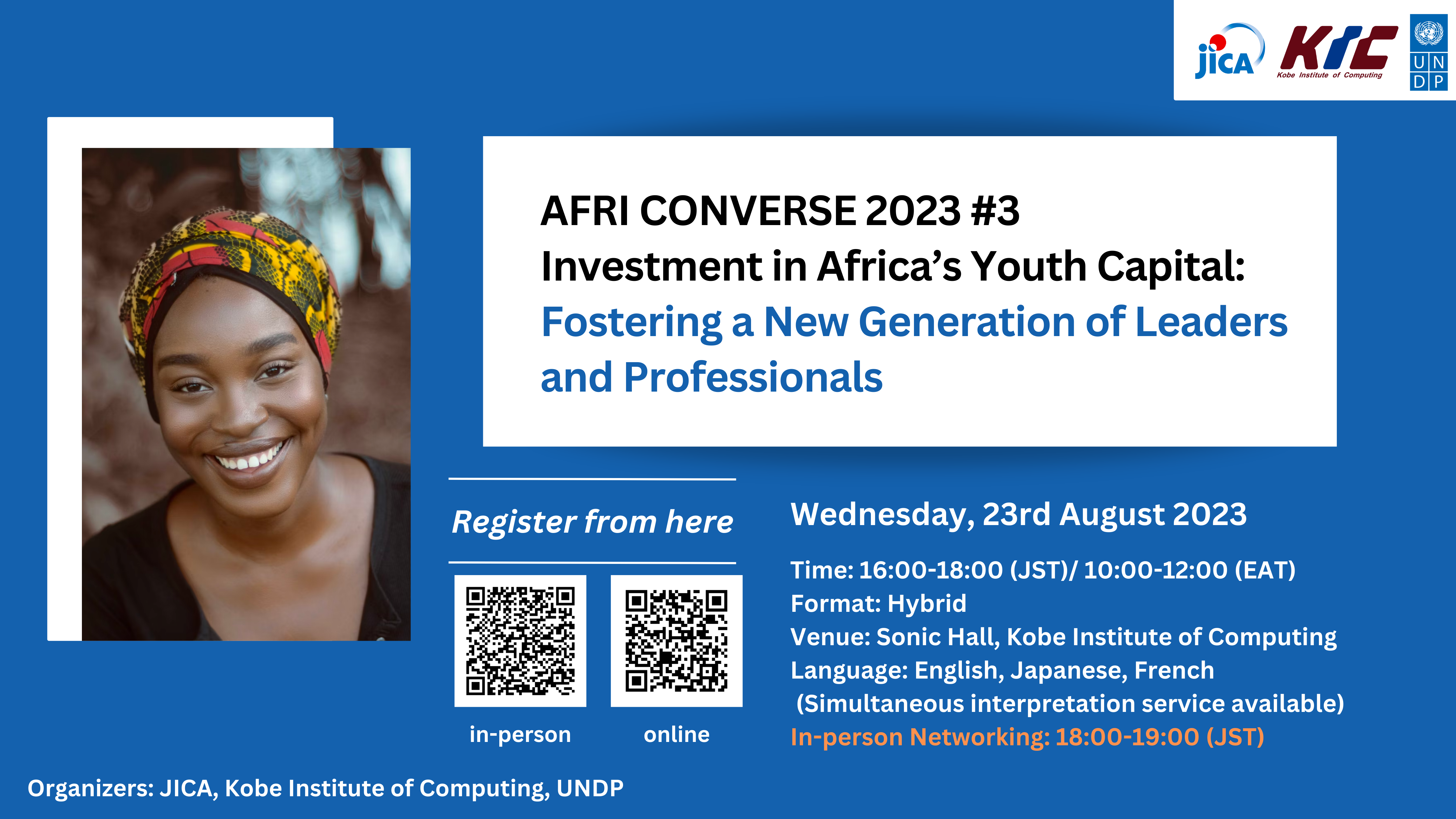Seminar AFRI-CONVERSE 2023 #03 “Investment in Africa’s Youth Capital: Fostering a New Generation of Leaders and Professionals”
2023.08.09

| Time | Programme |
| 16:00~16:03 | Opening, Introduction |
| 16:03~16:17 | Keynote Presentation |
| 16:17~17:50 | Panel Discussion |
| 17:50~18:00 | Closing |
| 18:00〜19:00 | Networking Session (In-person participants only) |
Africa has high potential in terms of economic development thanks to its abundant resources and population growth rate. However, the ratio of workers shows that the economy is still mainly agricultural, and the high potential is not being fully utilized. According to the ILO report, agricultural workers will still account for about half of the employed population in 2023, a declining trend compared to the average of 58% in the 1990s, but a much slower rate of transition than in other regions. The fact that African economies are dominated by primary industries such as agriculture or by mining industries with large price ups and downs makes people's livelihoods more vulnerable to the weather and global economic trends. This situation makes it essential for Africa to promote economic diversification and human resources to play a central role in the transition toward strong and sustainable growth.
Africa is the region with the youngest population and the numbers of African young people are expected to continue to increase rapidly in the foreseeable future. This provides an opportunity to reap the benefits of the demographic dividend, but only if young people have the necessary skills demanded in growth-enhancing sectors and if they are able to find productive employment. Given the recent setbacks to the economy, providing productive employment opportunities for young people emerges as a key priority for the region. Smart investments and pro-employment policies have the potential to ensure that the recovery from the pandemic not only generates employment for many, but also facilitates a transition towards a more sustainable and resilient future. Investment in youth talent is needed from the perspective of engaging Global South and African ownership over its development pathway. G7 communiqué explicitly noted the need for greater African representation in multilateral fora, which would require investment in human capital especially youth who holds a key for the continent’s future.
Against this background, the ABE initiative by JICA and the African Young Women Leaders Fellowship Program by UNDP, described in the later part, are two of these efforts, which are aimed at fostering the development of highly skilled human resources who will play a central role in developing industries and solving social problems in African countries. The Japanese government has positioned Africa as “a partner growing together with Japan” and has undertaken many initiatives. In August 2022, the 8th Tokyo International Conference on African Development (TICAD 8) was concluded in Tunis, Tunisia, and Prime Minister Kishida attended the conference, emphasizing Japan's commitment to "investment in people" and "the quality growth”. During the conference, the Government of Japan committed a combined public and private sector financial contribution of $30 billion.
In this regard, JICA, the bilateral development organization for Japan, has been implementing the ABE (African Business Education) initiative since 2014 to support African youth to obtain a master's degree in Japan and links with Japanese business, as an established platform for investment in youth talent. When they return to their African countries after completing their studies and internships in Japan, they not only contribute to the economic development of their respective countries as industrial professionals but also serve as a navigator bridging business between Africa and Japan. 2023 marks its 10th anniversary from its announcement made by then Prime Minister Shinzo ABE in TICADV 2013 in Yokohama.
As a leading development organization under the UN System, UNDP has also heavily invested in youth talent. Most recently, under the African Young Women Leaders Fellowship Programme, UNDP has provided African women with opportunities for growth through job opportunities and trainings at the UN in collaboration with the African Union. This initiative began in 2019, the 40 AfYWL Fellows were selected from a pool of 5,254 applicants in 2022. The Fellows has been deployed to 27 UNDP offices in Africa, Asia, Europe and the United States and work towards advancing the implementation of the SDGs and Agenda 2063 in the areas of climate change, energy, youth and women’s issues, economic transformation, peace and security and more. This is to enable them to gain valuable work experience as the next generation of African women or global leaders.
The session discusses about the future perspective of development in the continent with the perspective of investment in youth talent. High-level panel members will unpack the opportunities, gaps, and potential partnerships for jointly supporting growth and leadership development by African youth.
scroll